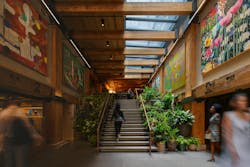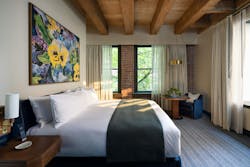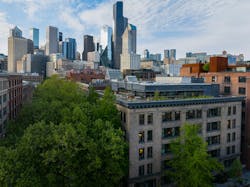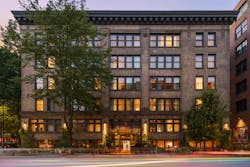Populus Seattle transforms historic warehouse into boutique hotel, adaptive reuse landmark
A historic steam supply warehouse in Seattle’s Pioneer Square has been reimagined as Populus Seattle, a 120-room boutique hotel designed by The Miller Hull Partnership, in collaboration with Urban Villages, Curioso, Aparium Hotel Group, and JTM Construction.
Located within RailSpur—a micro-district reviving a long-dormant rail corridor and alley intersection—the project breathes new life into the 1907 Westland Building through a technically ambitious and structurally sensitive adaptive reuse transformation. More than a hospitality destination, Populus Seattle is a catalyst for neighborhood revitalization and a model for historic preservation and sustainable urban redevelopment in Seattle.
Overcoming Structural Challenges Through Design and Engineering
Realizing the building’s full potential required addressing inherent structural limitations with a series of inventive architecture and engineering solutions that balanced preservation with performance.
Originally constructed for a steam pipe supply company, the Westland Building’s deep floor plates once limited daylight and ventilation. Reimagining the structure as a modern hotel prompted a bold intervention: expanding an existing central Sky Court, first cut in 1979, to channel natural light and fresh air into interior guestrooms, the lobby, and the hotel’s signature restaurant via a large skylight.
Joists supporting the new skylight were reclaimed from other parts of the building, restoring structural integrity where the 1979 cut had weakened it. Working closely with structural engineers at Coughlin Porter Lundeen, Miller Hull also repositioned the vertical circulation core, reestablishing a long-blocked pedestrian passage between the main entrance and an alley-side dining enclosure.
This new vertical core doubles as a stabilizing element, resisting seismic forces without intrusive diagonal bracing that would compromise either the historic exterior or the guestroom interiors—a critical achievement for seismic retrofitting in historic adaptive reuse projects.
Enhancing Public Space and Infrastructure Coordination
The sheltered outdoor dining area activates the RailSpur alley, invites public engagement, and sits atop an existing transformer vault, requiring complex approvals and close coordination with Seattle City Light. The result is a removable roof structure that accommodates future maintenance without compromising aesthetics or accessibility.
Miller Hull implemented critical seismic and mechanical upgrades with a light touch, preserving the building’s original brick façade and historic character. The team collaborated with the National Park Service’s Historic Preservation Tax Incentives Program to ensure all structural and architectural modifications aligned with federal standards for adaptive reuse.
Navigating Seattle Building Codes and Zoning to Unlock New Potential
Beyond architecture and engineering, the team also navigated complex regulatory terrain to unlock new possibilities for the building and the surrounding Pioneer Square neighborhood.
A pivotal aspect of Populus Seattle’s evolution was its engagement with changing codes and zoning ordinances. Leveraging Seattle’s newly adopted mass timber building codes, typically reserved for new construction, the design team adapted these guidelines to a historic structure—enabling the addition of a rooftop dining experience.
With Urban Villages and land use attorneys leading the effort, the team also championed a successful amendment to city zoning regulations, overturning a longstanding prohibition on rooftop food and beverage service in Pioneer Square. This legislative win not only cleared the way for the neighborhood’s first rooftop bar but also set a precedent for future adaptive reuse projects in Seattle.
Biophilic Design and Pacific Northwest Identity
Populus Seattle is conceived as a cultural hub where art, music, history, culinary experiences, and community converge. Guests enter through a lush, biophilic entry sequence into a grand lobby where plants, nature-inspired artworks curated by ARTXIV, and preserved Douglas Fir beams tell the story of the building’s layered past and present.
From there, a striking staircase leads to the second-floor restaurant and a glass-wrapped solarium, where greenery creates a seamless flow between indoor and outdoor spaces. Above, the rooftop bar—with sweeping views and a verdant landscape by Site Workshop—anchors the hotel in the surrounding city and natural context. Pacific Northwest-rooted details and preserved architectural elements, including exposed historic car decking and brick, strike a deliberate balance between natural beauty and urban edge.
A Model for Historic Preservation and Urban Redevelopment
Populus Seattle is part of a broader wave of adaptive reuse and redevelopment sweeping through Pioneer Square. Once sidelined by regulatory complexity and aging infrastructure, the neighborhood is now welcoming a surge of new energy, from converted office spaces to vibrant street-level amenities.
By restoring and reactivating the Westland Building, the project contributes to a walkable, culturally rich district where heritage and innovation intersect. With its mix of biophilic architecture, neighborhood-first programming, and curated art created on-site and inspired by the Pacific Northwest, Populus Seattle stands as both a historic preservation success story and a forward-looking model for adaptive reuse in urban cores.
On the Building Team
Owner and Developer: Urban Villages
Design Architect: The Miller Hull Partnership, LLP
Interior Designer: Curioso
Management: Aparium Hotel Group
Civil Engineer: MIG
Structural Engineer: Coughlin Porter Lundeen
Landscape Architect: Site Workshop
Envelope Consultant: Morrison Hershfield
Acoustical Consultant: Tenor
Vertical Transportation Consultant: Lerch Bates
Fire and Life Safety Code: Holmes Fire
Historic Report: Kathryn Rogers Merlino
Art Curator: ARTXIV
General Contractor: JTM Construction
About The Miller Hull Partnership, LLP
The Miller Hull Partnership, LLP is an internationally recognized architecture, planning, urban, and interior design firm that works to create a regenerative and inclusive future through the built environment. Since its founding in 1977, Miller Hull has been designing dynamic and environmentally responsible buildings that provide enduring value for their communities. The firm has a studio in Seattle and San Diego with work extending across multiple typologies for a range of public and private clients where people Live, Work, Learn, Gather and Serve. Widely recognized for innovative, timeless designs and a partnership-driven practice, Miller Hull has received over 350 local, regional, national, and international awards for design excellence, including the American Institute of Architects Firm Award and Architect 50’s Top Firm for Sustainability.



